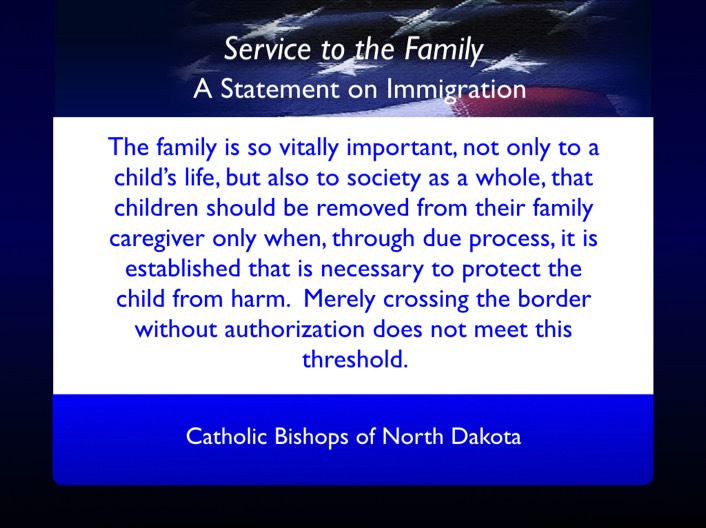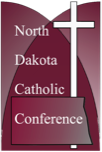
Service to the Family
A Statement on Immigration by the Catholic Bishops of North Dakota
We, the Catholic bishops of North Dakota, have grave concerns about the immigration situation on the United States’ southern border. While the location may seem distant from North Dakota, all involved on both sides of the border are our neighbors, whom we are commanded to love as ourselves.
Our immigration system needs an honest examination and correction. We must work toward reforming it in a way that protects our security while also respecting the dignity and safety of immigrants. These two aims are not mutually exclusive. Fixing the system is not just a responsibility of Congress and the President. The moral obligation rests with all of us according to our own capacities.
Partisanship, finger-pointing, ethnocentrism, and nationalism have no place in this debate. Nor does it serve us well to put undue emphasis on law and punishment without regard for the potential impacts on families. Finally, we should not vilify government officials tasked with executing difficult and sometimes confusing directives.
The teachings of the Catholic Church have much to offer on the issue of immigration. These principles are rooted in the church’s doctrine, which itself is grounded in Sacred Scripture. As pastors and bishops, we offer these principles for guidance, reflection, and prayer for the faithful and all people of good will.
At the center of this debate must be the human person and the family.(1) The purpose of all legal, governmental, and economic systems is to protect and foster the life and dignity of every human person. The preeminent and fundamental institution for safeguarding and promoting the life and dignity of every human person is the human family. For this reason, the family has a primacy that should not be violated by the government except in the most extreme cases when it is necessary to protect a person’s life.(2)
Indeed, all other principles for immigration policies can be seen as flowing from society’s service to the family. They are:
People have a right to migrate to seek safety, basic needs, work, and opportunities essential to their life and dignity and that of their families;(3)
Justice requires that countries receive immigrants, provided it is without actual detriment to the welfare of their citizens;(4)
Nations should provide immediate protection to refugees and asylum seekers who flee wars and persecution;(5)
Sovereign nations have the right to secure their borders, but this must be accomplished only for legitimate reasons for the sake of the common good and never in a manner that violates the basic rights and dignity of immigrants or the primacy of the family;(6)
Immigrants are obliged to respect with gratitude the country that receives them, to obey its laws, and to assist in carrying civic burdens;(7) and
The rights and dignity of all immigrants and their families must always be respected.(8)
While there are many aspects of immigration policy that everyone ought to examine and assess in light of these principles, events in recent weeks give us reason to comment on the issue of separating immigrant children from their families.
The family is so vitally important, not only to a child’s life, but also to society as a whole, that children should be removed from their family caregiver only when, through due process, it is established that removal is necessary to protect the child from harm. Merely crossing the border without authorization does not meet this threshold.
We welcome the President’s decision to no longer separate families crossing the border without authorization. In the meantime, we must work to reunite not only those families recently separated, but all detained immigrants separated from their families. Ever prophetic, Pope John Paul II made family reunification central to any immigration system, stating: “It is also the Church's task to appeal to the public conscience and to all those in authority in social, economic and political life . . . that [immigrant] families may be reunited as soon as possible. . .”(9)
Through the intercession of Saint John Paul II and Our Lady of Guadalupe, Patroness of the Americas, we pray for our country, for all immigrants, and for a just and humane immigration system that respects human life, dignity, and families.
July 4, 2018
†Most Reverend David D. Kagan
Bishop of Bismarck
†Most Reverend John T. Folda
Bishop of Fargo
1 Compendium of the Social Doctrine of the Church, nos. 252-254.
2 Catechism of the Catholic Church, nos. 2210, 2211.
3 Catechism of the Catholic Church, no. 2211; Pope Pius XII, Exsul Familia, no. 50; Pope John XXIII, Pacem in Terris, no. 25.
4 Catechism of the Catholic Church, no. 2241; Pope John XXIII, Pacem in Terris, no. 25.
5 Pontifical Council Cor Unum and Pontifical Council for the Pastoral Care of Migrants and Itinerant People,
Refugees: A Challenge to Solidarity (1992), nos. 13-14.
6 Catechism of the Catholic Church, no. 2241; Pope Pius XII, Exsul Familia, no. 51.
7 Catechism of the Catholic Church, no. 2241.
8 Pope John Paul II, Ecclesia in America no. 65.
9 Pope John Paul II, Familiaris Consortio, no. 77.
What We Do
The North Dakota Catholic Conference acts on behalf of the Roman Catholic bishops of North Dakota to respond to public policy issues of concern to the Catholic Church and to educate Catholics and the general public about Catholic social doctrine.

Contact Us
North Dakota Catholic Conference
103 South Third Street, Suite 10
Bismarck, North Dakota
58501
1-888-419-1237
701-223-2519
Contact Us

